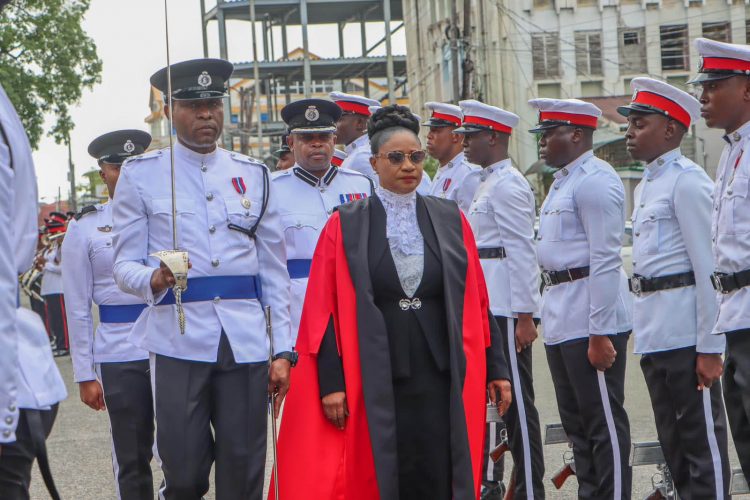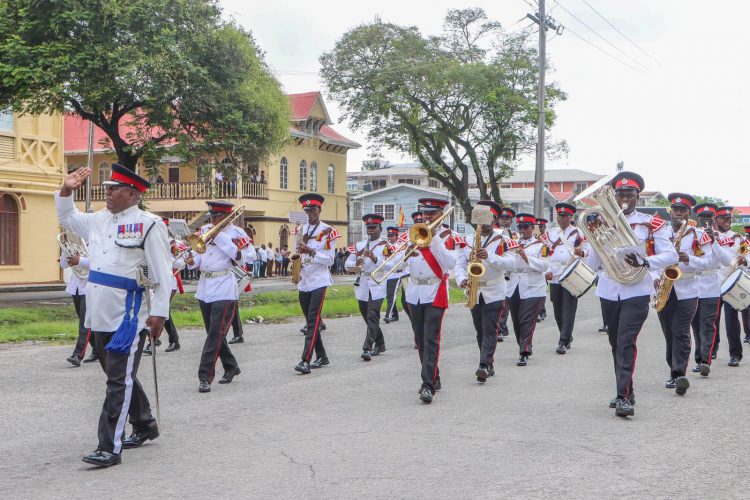Chancellor of the Judiciary (ag), Yonette Cummings-Edwards yesterday made an urgent appeal for the constituting of the Judicial Service Commission (JSC) and the appointment of more judges as she lamented the burdens now facing those sitting on the bench.
Speaking at the opening of the Law Year 2023, Justice Cummings-Edwards said: “You have heard the call for more resources, human resources in particular. We need more judges! We need the Judicial Service Commission to be established ASAP – as soon as possible. We are facing increased case loads. Judges are now overburdened, they are exhausted, they are nearly worn out and they are, in some cases, burned out”.
She added: “We have had psychologists come in to do …psycho-social therapy, especially during the COVID-19 years but that in itself cannot help. We need to have more persons on board to assist us in carrying out our mandate of providing justice”.


She said that the judiciary wants to see action and not just keep hearing promises that the establishment of the JSC would be “soon.”
“We do not need the rhetoric. We need more labourers. We need the judges. We’ve been hearing time and again about the JSC is soon to be established. We would like to see the implementation and the establishment of the Judicial Service Commission,” she said.
The Chancellor reasoned that although the country’s parliament could enact new legislation for development, without an ample judiciary to interpret those laws, their act would be futile. “We need the judges to interpret those legislation, we need the judges to implement those legislation so that we can have an orderly society,” she reasoned.
What is even more unusual about the Chancellor’s stirring appeal is that it came after Attorney General Anil Nandlall SC promised that the JSC would be in place long before the end of the first quarter of this year.
“I have heard the lamentations, properly made, regarding the shortage of judges. First of all, I want to assure the judiciary and all those present that I am painfully aware of this deficiency. Secondly, I want to congratulate the complement of judges that have not been intimidated by this deficiency but have been able to muster the will to still deliver a system of quality justice to the people of our country,” Nandlall yesterday told the ceremonial opening of the Demerara Assizes and the launch of the Law Year 2023.
He added, “Thirdly, I want to assure that very, very early this year, long before the end of the first quarter of this year, we would have appointed the Judicial Service Commission and the Public Service Commission; two important constitutional commissions that will address the inadequacies of human resources that currently plague the juridical institution.”
A series of steps have to be taken by the government and the legislature.
While he promised by the end of the first quarter, both the former APNU+AFC administration and Nandlall’s government have failed to deliver a new JSC for years. In the face of retiring judges and increased case filings, judges have faced a punishing load.
The life of the last JSC expired in 2017 and the former APNU+AFC government failed to act up to when it left office on August 2nd 2020. Since the PPP/C acceded to office, 29 months have elapsed without the appointment of the JSC and there have been numerous excuses from the administration as to why the JSC and other service commissions have not been appointed.
The administration has also not moved on the substantive appointments of a Chancellor and Chief Justice.
The Attorney General spoke after addresses by the Acting Chief Justice Roxane George-Wiltshire SC, Director of Public Prosecutions Shalimar Ali-Hack SC, and President of the Bar Association Pauline Chase.
He left before Justice Cummings-Edwards gave her address where she called for the swift appointment of the body charged with appointing judges and echoed sentiments that presiding judges were overworked.
“Some of the more exciting things for us in the judiciary is the commitment to appoint the JSC and to continue to support us to provide the necessary resources… so that we can realize our mandate,” she said before launching her urgent plea for the swift appointment.
Brunt
For her part, the acting Chief Justice expressed appreciation for government’s provision of infrastructure and financing but said that while buildings are necessary as part of improvements to the court’s plan, it is the people who work in them that afford changes. “Buildings do not serve people or provide justice. People do”, she said.
She pointed out that while this country’s Judicial Strategic Plan would entail upgrades to the system designed to keep up with the technologically savvy world, while simultaneously delivering effective and efficient judicial administration, it has also identified that there be adequately compensated human resources.
The Chief Justice bemoaned the “extremely high” case load of judges, as she also pointed out that on average, a civil judge would oversee a constant docket of 200 to 400 court cases at any one time, managing cases for all three counties.
Criminal judges, she explained, are also assigned some civil matters to assist with the case load while the two Commissioners of Titles “carry a case load of thousands for all three counties.”
With Guyana becoming a highly litigious society, the Chief Justice said that as a receiver of cases with no control of matters filed, “the court system will bear the brunt of the cases filed.”
She explained that it is because of the shortage of staff in the system that written judgments were not a sustainable task and thus some cases would have to have oral judgments. “The days of lengthy written judges can no longer be maintained for all cases,” she contended.
Director of Public Prosecutions Shalimar Ali-Hack also highlighted that the system needed more judges so that justice could be swift for the persons who make up the number of backlogged cases. According to the DPP, some 308 cases are listed to be heard by just three judges in the Demerara Assizes.
She pointed out that one of the three judges would be sitting in the Sexual Offences Court where there are 134 cases listed and the remaining 174 cases are listed to be heard by two judges.
Giving a breakdown, she related that that 174 cases include 61 cases for the offence of murder and 24 cases for manslaughter.
Pressure
President of the Guyana Bar Association, Pauline Chase, said that the lack of adequate judicial staffing severely undermines the administration of justice. “We at the Bar are acutely aware of the pressure that this is placing on the system,” she said, while likening the small complement of judges to that of the mythical Atlas holding up the globe.
But the Bar president was quick to also point out that while the judiciary was doing the best it can with its small staffing complement, it could not be sustained, “Pressure, science teaches us, eventually gives way. Help is desperately needed,” she said.
The Attorney General responded that government understands the pressures faced and is activating a resolution on the financial side with budget allocations and paving the way for more judicial appointments by having the Commission appointed.
Commitment
“I want to assure that the government recognizes, both philosophically and pragmatically, the indispensable role that the judiciary must play in the economic and social transformation taking place in our country. That is a commitment that no one should ever second guess. In the discharge of that commitment the judiciary is assured and will confirm that by and large, as it is, resource permitting, it has been fully and adequately resourced in its plans of modernizing and advancing the (judicial) work …as well as the judiciary as an institution,” Nandlall stressed.
He said that in Monday’s 2023 Budget, the Minister of Finance would have allocated to the judiciary, “several billion dollars” which he believes will “bring into fruition the plans that the judiciary would have independently constructed and put to the Ministry of Finance.”
He noted that government had altered the budgetary accounting process to ensure that there is a direct interaction between the judiciary and the Ministry of Finance in terms of financing and their allocation this year would be reflective of what they prioritized.
Turning to the Chief Justice, the Attorney General told her that he heard her pleas about inadequacy of judges as well as the inadequacy of support staff, whom he also believes are instrumental in ensuring that the judges deliver on their constitutional obligations. It is why the appointment of the Judicial and Public Service Commissions, respectively, the Attorney General noted, is important as they will pave the way to address the human resources deficit bemoaned by yesterday’s speakers.
“The appointment and operationalization of these two independent constitution commissions will address these deficiencies and you have our full commitment that those issues will be addressed,” Nandlall said.





